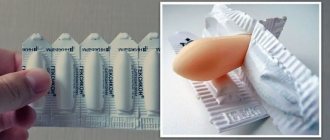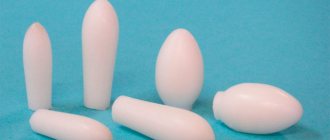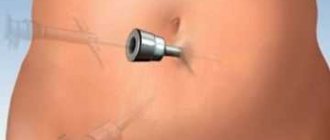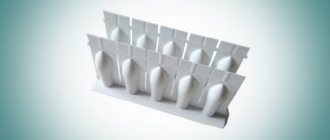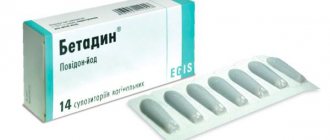Undiagnosed or untreated gynecological diseases lead to terrifying consequences for women's health. It's all about the adhesive process, which provokes infertility. Abortions performed in the past can also deprive a woman of the joy of motherhood, because this medical manipulation also causes the formation of adhesions in the pelvis. Scientists around the world, together with gynecologists, are developing methods that could defeat the adhesive process. One of them is the use of the drug Longidaza, which can restore female fertility.
The relationship between adhesions and infertility
Longidaza is prescribed for infertility to remove adhesions. This is the so-called whitish film that forms on the internal genital organs. Basically it closes the fallopian tubes. The adhesive process begins when the body tries to fight the following problems:
- inflammation of the appendages;
- infectious lesion of the genital organs;
- uterine injury.
Adhesions allow you to stop the purulent inflammatory and infectious process. They have a protective function. However, dense formations seriously impair the function of fertilization and can interfere with procreation. Negative effects of adhesions:
- prevent the sperm from passing through the fallopian tubes;
- do not allow the uterus to expand during pregnancy;
- prevent the release of the egg necessary for fertilization;
- prevent the meeting of mother's and father's zygotes.
As a result, adhesions interfere not only with the conception of a child, but also with the development of the embryo, since they often block the processes occurring in the uterus. But this organ necessarily increases during pregnancy. The process of formation of adhesions is reversible.
Pregnancy occurs quickly after removing the film, and, despite the illness, the patient no longer suffers from infertility. Adhesions can be removed surgically. But after surgery they may occur again. The optimal way to combat these formations is to use Longidaza suppositories for rectal or vaginal administration.
Composition of Longidaz suppositories and injections
Longidaza suppositories - suppositories against infertility, are not the only form of release of the drug. Ampoules for intravenous administration are also produced. However, in gynecology, the practice of using suppositories is more common - they have a targeted effect and actively affect the site of the disease.
The suppository contains:
- Excipients;
- hyaluronidase.
Hyaluronidase, which is included in Longidase suppositories for infertility, is a substance related to hyaluronic acid. It activates the process of disintegration of adhesions and easily removes the film, restores the softness of the fallopian tubes, and stimulates natural regeneration functions.
The excipient helps to gently introduce the drug into the affected area and increases the absorption of the active compound.
Composition and principle of action
“Longidase” refers to enzyme preparations and contains bovhyaluronidase, an “improved” version of the natural human enzyme. The most popular are suppositories for rectal and vaginal use, but the drug is also available in ampoules for intramuscular and subcutaneous administration. The main properties of the medicine are as follows:
- anti-inflammatory;
- antioxidant;
- immunomodulatory;
- enzymatic.
Longidaza works best as a preventive measure for adhesions. In this case, its antifibrotic properties are due to the following:
- reduces the amount of inflammatory mediators in the lesion - they damage tissues and contribute to the further formation of adhesions in them;
- resistant to high temperatures - the usual enzyme hyaluronidase stops working at 37 ° C, which is why most often adhesions are the consequences of complicated healing, with fever and suppuration;
- inactivates stimulators of collagen formation - it is from this that adhesions begin to be “built”;
- acts on glycosaminoglycans - this is an integral part of already formed “threads”, destroying the bonds between glycosaminoglycans, hyaluronidase reduces the tension of adhesions, relieves swelling, and increases the mobility of previously fixed parts of organs.
“Longidase” specifically destroys protein complexes, preventing the formation of pathological cell growths. If adhesions already exist, it partially destroys their structures, thereby reducing the clinical manifestations of the disease.
Advantages of the product
Longidaza is a safe medicine. According to the instructions, the drug has the following advantages:
- does not increase the risk of cancer;
- does not suppress actively dividing cells;
- does not affect eggs and sperm;
- does not cause allergic reactions;
- does not impair tissue healing;
- does not provoke the development of inflammation;
- does not slow down bone recovery after surgery;
- does not accumulate in tissues;
- distributed throughout the body evenly;
- bioavailability of the drug in suppositories is about 90%;
- maximum concentrations in the blood are reached within an hour;
- enhances the effect of painkillers and antibiotics.
All of the presented properties provide the main therapeutic effect of Longidase. The drug regulates the formation of connective tissue in the body (and this is the basis of adhesions), without causing serious side effects. All this contributes to its wide popularity.
Pharmacological and pharmacokinetic action
You can use suppositories without fear of serious side effects, since the action is clearly directed. The drug is absorbed only in the genital area and is quickly eliminated without affecting systemic functions and internal organs.
Hyaluronidase has the following actions:
- stimulates the breakdown of adhesions;
- removes waste and toxins (antioxidant);
- inflammatory processes stop;
- activates tissue regeneration after surgery.
Due to this range of positive effects, the drug is often prescribed to patients with disorders of the genital organs. Longidaza is considered one of the safest and most effective remedies.
Analogs
There are no complete analogues of the drug. Among the drugs with a similar effect are the following:
- "Wobenzym" - contains a complex of plant enzymes and those obtained from animals;
- “Lidase” – contains hyaluronidase as an active component;
- Phlogenzyme is a complex of three enzymes.
The effectiveness of Longidase depends not only on the timeliness of the prescription, but also on the characteristics of the woman’s body. Both injections and suppositories can be used. Reviews of Longidaza suppositories indicate simplicity, ease of use and virtually no side effects.
The use of Longidaza suppositories in gynecology
The medicine is prescribed for various lesions of the genital organs. These are not only processes that threaten a woman’s fertility, but also any other abnormalities that can result in scarring and inflammation. Indications for use of the drug:
- recovery period after surgery;
- inflammation of the appendages;
- chronic endometritis;
- adhesions and scar formations in the genital area;
- infertility caused by adhesions.
Longidaza is prescribed to patients over 12 years of age, with the exception of people with kidney problems or pulmonary hemorrhages.
Longidaza suppositories for inflammation of the appendages
In the pelvis, with inflammatory processes in the appendages, the risk of infertility increases. To reduce the likelihood of decreased fertility and removal of these organs, suppositories are prescribed.
Soft tissues in gynecology are restored through the administration of Longidase and other auxiliary drugs. Suppositories are only part of complex therapy. After a month, the inflammation stops and the tissue condition returns to normal.
For chronic endometritis
In cases of diseases accompanied by endometrial hyperplasia, suppositories are prescribed. They reduce swelling of the uterus and appendages and stop inflammation. Patients note positive changes after 1-2 courses of treatment for endometritis, which can also cause infertility.
To whom and when are suppositories prescribed?
Obstetricians-gynecologists recommend these suppositories for complex treatment in the formation of adhesions. Typically, this pathology is closely associated with endometritis that has become chronic, ovarian cysts, endometriosis, intrauterine synechiae and tubal-perinatal infertility. In addition, these suppositories are often prescribed for prophylactic purposes to prevent adhesions after abortion and laparoscopy performed on the pelvic organs.
The result of use is the disappearance (resorption) of scars and fibro-granulomatous adhesions. It is also very important that the effect of the suppositories affects exclusively the area where the pathology is detected. Longidase has no effect on healthy areas. No carcinogenic or teratogenic effect was noticed as a result of practical use.
In addition, these suppositories have a number of “bonuses” for patients in the form of anti-inflammatory, antioxidant and immunomodulatory effects. They not only resolve scars, but also reduce swelling of connective tissues, reducing the risk of adhesions to zero. When can I use the product? Can Longidaza be used during menstruation?
We recommend reading the article about the treatment of endometritis. From it you will learn about the disease and its symptoms, the reasons for the development of endometritis in a woman, treatment of the chronic form and possible complications after endometritis.
Longidaza suppositories for prostatitis
Suppositories can be prescribed in urology for the treatment of chronic prostatitis. They are especially often prescribed for congestive lesions of the prostate gland. Hyaluronidase heals damaged tissues and reduces inflammation. The main advantage that the drug has is that it improves blood circulation in the gland area, which helps get rid of swelling, pain, and inflammation.
The use of Longidase for chronic prostatitis is safe for men, does not lead to damage to healthy tissue, and helps to get rid of infertility. It is recommended to use rectal suppositories instead of injections.
Treatment regimens
The patient can choose to inject the active substance intravenously or use suppositories. Each application scheme has its advantages and disadvantages.
Use of Longidaza injections
Longidaz injections are used for a month. It is advisable that the injections be administered by a doctor. This method of therapy is usually prescribed for inpatient treatment after surgery. A month after injection therapy, the substance is removed from the body, and taking similar drugs is prohibited.
Candles
Suppositories are administered rectally or vaginally. They should be used regularly - every day or every three days, depending on the severity of inflammation.
The standard course of treatment with Longidaza suppositories is 20 days, but if necessary, it can be increased to 60 days. Repeated therapy is allowed, but only 3 months after the last course.
Scheme for using Longidase:
The treatment regimen for gynecological pathologies may include the administration of the drug Longidaza both in the form of injections and in the form of suppositories (rectal and vaginal suppositories). The doctor decides which form of the drug is necessary. It should be noted that the use of the drug in the form of suppositories is much more convenient than in injections, however, the bioavailability of the active substance is higher with the parenteral (injection) route of administration of the drug. Longidase injections are performed intramuscularly. The drug is diluted with saline solution (0.9% sodium chloride solution), water for injection or procaine. The number of necessary injections is determined by the diagnosis. Typically the course ranges from 5 to 25 injections, and they are performed at intervals of 3-10 days. If necessary, the course is repeated several months later. Longidaza in the form of suppositories can be used vaginally or rectally; the course of such treatment ranges from 10 to 20 days. Typically, suppositories are also used not daily, but every 1-3 days. After 3 months, the course of treatment can be repeated, after which you can switch to maintenance therapy, using 1 suppository once a week for 3 months.
Advantages of the drug
"Longidaza" has several actions at once, which is its main advantage. Only this drug gives many effects at the same time:
- anti-inflammatory;
- cleansing;
- therapeutic (elimination of adhesions after surgical interventions);
- regenerating.
Another advantage of treatment with Longidase is the direction of action. There is no need to fear that the active substance enters the bloodstream and will have a negative effect on the body (with the exception of the use of injections).
The drug quickly affects the disease and eliminates it without obvious side effects.
Recommendations for use
According to the manufacturer's idea, Longidaza suppositories can be used for both vaginal and rectal use. Of course, the vaginal method is considered more effective. But the question of whether Longidaza can be taken during menstruation is relevant for many patients.
The answer is yes, but there are some recommendations. “Critical days” make adjustments: during menstruation, suppositories must be inserted into the rectum (rectally). Before this, you should empty your bowels. If you cannot do this naturally, it is recommended to cleanse with an enema. So even though the drug Longidase is a suppository, they are also used during menstruation, the method of administration simply changes.
Unfortunately, the therapeutic effect is lower. This is why it is best to start treatment after menstruation has ended.
Therefore, although the answer to the question of whether Longidaza can be given during menstruation is positive, you need to understand that the treatment will not be as effective.
The instructions for the drug say that suppositories should be administered every day, 1 at night for ten to twenty days. The duration of treatment is prescribed by the attending doctor and depends on the severity of the situation (how advanced the disease is).
As a rule, prophylactic therapy is required after completion of treatment. One candle is placed weekly for several days (traditionally three to four).
Contraindications
The drug is prohibited for use by children under 12 years of age. It can have negative effects on children. You should also not use the medicine if:
- renal failure;
- risk of pulmonary hemorrhage.
If there is a risk of these phenomena, you should consult your doctor about the need to use the medicine.
It is strictly forbidden to use the medication for the following problems:
- individual intolerance to the drug;
- oncological processes in the body;
- pregnancy;
- lactation.
If necessary, you can find analogues of the medication without the listed prohibitions.
Longidaza during menstruation: how to use suppositories
The drug Longidaza is available in the form of suppositories and is used in gynecology. The drug has an immunomodulatory effect. Most often it is used in the treatment of adhesions formed for various reasons, chronic endometritis and other diseases in women. Longidaza suppositories are prescribed rectally during menstruation, which allows you not to interrupt the course of treatment.
Use during menstruation
The suppositories are suitable for both vaginal and rectal use, so they can be placed even during menstruation.
The components of the drug are better absorbed vaginally, but when used correctly they are also very effective when administered into the rectum.
The effect of the suppositories is slightly reduced, but if you first empty your bowels and do a cleansing enema, then rectal use of Longidase becomes a good alternative for menstruation.
Experts recommend starting treatment immediately after menstruation so that Longidaza suppositories give maximum results, but if you had to continue therapy during your menstrual period, then their rectal use will be a way out of the situation.
According to the instructions, the product is inserted into the vagina once a day. You must first cleanse your intestines.
However, the indicated dosage may change: the doctor selects an individual regimen for each woman, determining when the drug can and should be administered into the colon.
Longidaza in gynecology
Longidaza is a suppository and belongs to the group of immunomodulators. Suppositories also have anti-inflammatory and antioxidant properties. Under their influence, not only scars dissolve, but also tissue swelling and inflammation are relieved, and the risk of new adhesions is reduced.
The cause of the development of synechiae can be surgical intervention, advanced inflammatory processes and pathological growth of the inner lining of the uterus.
If the underlying disease is not treated, transparent films soon appear on the surface of the diseased internal organ. After some time, instead of adhesions, a scar forms.
This condition becomes the main cause of infertility and many other gynecological diseases.
The active substance of the suppositories penetrates deep into the tissues, thereby quickly eliminating adhesions and inflammation.
Scars also resolve under the action of Longidase. If a woman has had an abortion, she is often prescribed this drug for preventive purposes. Longidaza does not have any negative effect on healthy tissue.
Indications for use
The drug is used in gynecology for the complex treatment of the following diseases:
- adhesions in the pelvic organs;
- endometritis;
- endometriosis;
- ovarian cyst;
- infertility;
- prevention of adhesions formation.
To prevent the development of adhesions, Longidase is used after laparoscopy. Many inflammatory processes are accompanied by adhesions, which is why the drug is widely used in medicine.
Methods of using candles
Longidaza is used in the form of suppositories, because this way the components of the drug can penetrate as close as possible to the inflamed tissues. The drug is used vaginally and rectally, but it is better to start a course of therapy after menstruation, since it acts faster and more effectively through the vagina.
For treatment, you need to put one candle once a day. The course consists of 10 or 20 candles, which usually need to be placed once every 3 days. Treatment can be repeated no earlier than after 3 months. The duration of therapy always depends on the stage of the disease and its course. Often, after the main course, the doctor prescribes Longidaza to maintain the result.
Contraindications of the drug
The use of suppositories has some limitations. Among the contraindications are the following:
- presence of pulmonary hemorrhages;
- high sensitivity to the active substance of the drug;
- children under 12 years of age;
- bleeding from the uterus;
- impaired kidney function, chronic diseases;
- malignant processes;
- pregnant women;
- mothers who are breastfeeding their baby.
If it is necessary to use suppositories during lactation, you need to stop feeding the baby for a while and replace the mother's milk with an artificial formula.
Possible side effects
Among the identified side effects, only an allergic reaction was observed due to individual sensitivity to the components of the suppositories. Such cases are quite rare.
After using Longidase, the structure of the uterine mucosa is normalized, inflammatory processes disappear and the number of adhesions is significantly reduced.
With proper treatment, the adhesions will go away, the patency of the fallopian tubes will improve, which will help the woman bring the long-awaited pregnancy closer. The use of the drug in gynecology allows many women to conceive a child.
Longidaza has also shown excellent properties in the prevention of adhesions in women after abortion or after laparoscopy.
Suppositories can be purchased at any pharmacy, but before using them, you should definitely consult with a doctor, who will conduct an examination and determine the stage of the disease, as well as the duration of therapy. Menstruation should not be an obstacle to the treatment of female diseases, which is confirmed by the example of the drug Longidaza.
httpss://youtu.be/_T0lOx8qcWo?t=13s
Source: https://omesyachnyh.ru/preparaty/longidaza-vo-vremya-mesyachnyx.html
Side effects
The list of side effects of a drug such as Longidaza is small. Mostly, patients do not suffer from any discomfort. If the dosage is exceeded, the following may occur:
- dizziness;
- decreased libido;
- headache;
- burning sensation in the genital area.
If the rules of administration are followed, violations rarely occur and most often consist of allergic reactions to the components of the composition. They can be expressed in swelling, mild rash. If an allergy is detected, it is necessary to change the drug to an analogue.
Who shouldn't
Despite the relative safety of Longidase and good tolerability, there are contraindications to the drug. These include the following:
- hypersensitivity to the components of the drug;
- bleeding from the lungs;
- vitreous hemorrhage;
- diagnosed oncological diseases;
- renal failure;
- not recommended during pregnancy and lactation.
Complications of taking
Reviews from doctors and women who have used the drug indicate the following possible side effects:
- pain - at the injection site when using injections;
- itching, redness, slight swelling - at the injection site or in the vulva and vaginal area.
Usually, all discomfort associated with the use of the medicine goes away on its own within three days and does not require additional treatment. If doses and dosage regimens are not followed, an overdose may occur. The condition is characterized by fever, headache and dizziness, and a drop in blood pressure. In this case, you must seek medical help.


